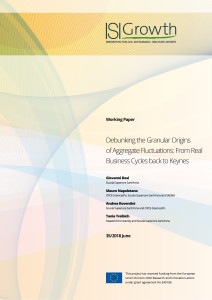In this work we study the granular origins of business cycles and their possible underlying drivers. As shown by Gabaix (2011), the skewed nature of firm size distributions implies that idiosyncratic (and independent) firm-level shocks may account for a significant portion of aggregate volatility. Yet, we question the original view grounded on “supply granularity”, as proxied by productivity growth shocks – in line with the Real Business Cycle framework–, and we provide empirical evidence of a “demand granularity”, based on investment growth shocks instead. The role of demand in explaining aggregate fluctuations is further corroborated by means of a macroeconomic Agent-Based Model of the “Schumpeter meeting Keynes” family (Dosi et al., 2015). Indeed, the investigation of the possible microfoundation of RBC has led us to the identification of a sort of microfounded Keynesian multiplier.
Debunking the Granular Origins of Aggregate Fluctuations: From Real Business Cycles back to Keynes
Giovanni Dosi
Scuola Superiore Sant’Anna
Mauro Napoletano
OFCE-SciencesPo, Scuola Superiore Sant’Anna and SKEMA
Andrea Roventini
Scuola Superiore Sant’Anna and OFCE-SciencesPo
Tania Treibich
Maastricht University and Scuola Superiore Sant’Anna
Working Paper
35/2018 June

